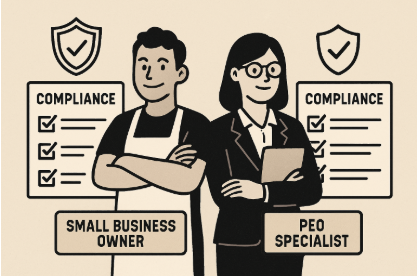
How PEOs Safeguard Small Businesses from HR Compliance Risks
Key Takeaways
- PEOs provide comprehensive HR services, helping small businesses navigate complex compliance requirements.
- Partnering with a PEO can reduce the risk of legal penalties associated with HR mismanagement.
- PEOs offer access to better employee benefits, enhancing talent attraction and retention.
Navigating the complex world of human resources can be a daunting challenge for small businesses. From labor laws and tax regulations to benefits administration and workplace safety, the risk of noncompliance can have significant financial and legal consequences. Professional Employer Organizations (PEOs) offer a strategic solution by sharing employer responsibilities and providing expert guidance on HR compliance. By leveraging a PEO’s knowledge and resources, small businesses can focus on growth and operations while reducing the likelihood of costly errors, penalties, and legal disputes.
Small businesses face constant challenges in navigating the maze of human resources (HR) compliance, often with limited internal expertise. From evolving labor laws to increasingly complex regulatory requirements, staying compliant can be a daunting, time-consuming task for business owners. In this high-stakes environment, many small companies turn to Professional Employer Organizations (PEOs) to provide compliance expertise for SMBs, allowing them to focus on strategic growth rather than getting bogged down in HR administration.
PEOs act as comprehensive HR partners, handling everything from payroll to benefits administration and risk mitigation. With their specialized knowledge and ability to provide up-to-date guidance on employment laws, PEOs are instrumental in helping small businesses avoid costly compliance errors. These partnerships are often life-changing for business owners, transforming the burden of regulatory adherence into a manageable, streamlined process.
Proactive management is crucial because HR compliance violations can result in significant penalties, lawsuits, and reputation damage. PEOs not only reduce risk but also give small companies access to better benefits and employee services than they could otherwise afford. For growing organizations looking to compete for top talent and operate with confidence, leveraging PEO support is both a strategic necessity and a competitive advantage.
Small businesses seeking to thrive in a modern regulatory landscape must carefully consider their approach to compliance. Whether you’re a startup or an established player, understanding the value PEOs bring to HR management is a vital step toward securing your business’s future.
Understanding HR Compliance Challenges for Small Businesses
The HR landscape is continually shifting as federal, state, and local regulations evolve. For small businesses lacking in-house legal teams or full-scale HR departments, the risk of unintentionally violating labor laws is ever-present. Common issues include misclassifying employees, failing to maintain the proper documentation, and not keeping up with wage and hour compliance. Each of these has real financial and legal consequences. For instance, incorrectly labeling an employee as an independent contractor instead of a staff member can trigger audits, back pay requirements, and stiff penalties from agencies like the Department of Labor.
Compliance errors are not limited to pay classification. Many small businesses struggle to implement effective workplace policies, manage leaves of absence under the Family and Medical Leave Act (FMLA), and adhere to anti-harassment and discrimination laws. With the Occupational Safety and Health Administration (OSHA) intensifying enforcement and states rolling out new paid leave programs, the risk profile is expanding. Staying ahead of these changes requires both vigilance and expertise, luxuries that many SMBs simply don’t have the bandwidth for.
The Role of PEOs in HR Compliance
PEOs operate through a co-employment model, sharing certain employment-related responsibilities with their client businesses. This arrangement allows PEOs to handle crucial activities such as payroll processing, regulatory reporting, employee onboarding, and benefits administration. Their dedicated specialists monitor legislative developments and adjust HR processes accordingly, keeping client businesses in compliance and out of legal jeopardy. The competitive edge lies in the PEO’s ability to standardize HR best practices across all client companies, ensuring everyone benefits from up-to-date knowledge and streamlined procedures.
By leveraging technology and robust legal resources, PEOs can quickly implement policy updates and compliance training. This proactive approach is especially valuable in industries with frequent regulatory changes, such as healthcare, manufacturing, and hospitality. According to the National Association of Professional Employer Organizations (NAPEO), companies that utilize PEO services experience fewer compliance violations and are better equipped to handle audits and litigation compared to those managing HR in-house.
Benefits of Partnering with a PEO
PEOs (Professional Employer Organizations) provide specialized expertise in compliance with labor laws and regulations, helping businesses stay compliant and avoid costly penalties or litigation. They offer access to enhanced benefits by combining employees from various client companies, allowing small businesses to access high-quality health coverage, retirement plans, and wellness programs typically available to larger firms, thus enhancing talent retention. Additionally, PEOs play a crucial role in risk management by establishing effective workplace safety protocols and conducting training, which aids in minimizing workplace injuries and claims related to discrimination and workers’ compensation. Furthermore, by outsourcing complex HR tasks, PEOs enable small business owners to focus more on their core objectives, supporting operational efficiency and growth.
Potential Drawbacks of PEO Partnerships
Though PEOs provide significant safeguards, there are important considerations to weigh. One potential drawback is a perceived loss of control, as PEOs may standardize certain HR policies or procedures across their client base, affecting how internal culture is shaped. Additionally, while PEO fees are often outweighed by their value, the direct costs can be challenging for very small or bootstrapped startups. Data accessibility is another factor; when HR functions are outsourced, obtaining employee information swiftly for strategic decisions or unique circumstances may be less immediate than with in-house management.
Choosing the Right PEO for Your Business
To maximize the benefits of a PEO partnership, business owners should thoroughly assess their organization’s needs, service expectations, and compatibility with prospective providers. It’s essential to vet a PEO’s reputation, compliance record, available benefits, technology platform, and customer service track record. Look for accreditation from the Employer Services Assurance Corporation (ESAC) and evidence of transparent billing practices. The right PEO will offer tailored support, regular communication, and seamless integration with your company’s values and strategic goals.
Conclusion
PEOs have become indispensable allies for small businesses facing a rapidly evolving regulatory environment. By leveraging the compliance expertise and resources of a reputable PEO, business owners can safeguard their organizations against HR-related risks, elevate the quality of their employee benefits, and reclaim the freedom to grow their operations with confidence. When carefully selected, a PEO partnership can transform HR from a source of anxiety into a wellspring of stability and competitive advantage.









